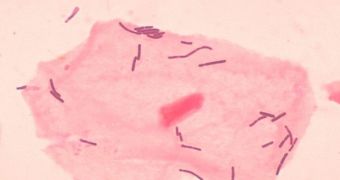A group of scientists from the Alimentary Pharmabiotic Center (APC), Cork, University College Cork and Teagasc, in Ireland, designed probiotics that can change the physiology of fat cells, possibly finding a way of treating conditions like obesity.
They actually engineered a strain of Lactobacillus to produce a version of a molecule called conjugated linoleic acid (CLA).
CLA is a fatty acid that is produced in different versions by different bacteria, and t10, c12 CLA has been proved to have a connection with decreased body fat in humans and animals.
This type of fatty acid has the ability to stop the growth of colon cancer cells and induce their death, but it is only produced by certain types of bacteria including Propionibacterium acnes – a skin bacterium that can cause acne.
Lactobacillus strains normally live in the gut flora and are very common in probiotic products, so for this study, an enzyme-encoding gene from P. acnes was transferred to the Lactobacillus strain allowing it to produce t10, c12 CLA.
The researchers found that the level of t10, c12 CLA in the mice’s fat tissue multiplied by four when they were fed this recombinant probiotic, proving that ingesting live bacteria can affect metabolism at remote sites in the body.
“CLA has already been shown to alleviate non-alcoholic fatty liver disease that often accompanies obesity,” said Dr Catherine Stanton, from Teagasc, leader of the study.
“Therefore, increasing levels of CLA in the liver by ingestion of a probiotic strain is of therapeutic relevance.
“Furthermore, fat is not an inert layer around our bodies, it is active and proinflammatory and is a risk factor for many diseases, including cancers.
“The work shows that there is potential to influence this through diet-microbe-host interactions in the gut.”
And since the same group of researchers had already found that microbially produced CLA managed to reduce the viability of colon cancer cells by 92%, they said that “it is possible that a CLA-producing probiotic may also be able to keep colon cancer cells in check.
“All our findings to date demonstrate that the metabolism of gut bacteria can modulate host cell activity in ways that are beneficial to the host,” Dr Stanton explained.
“We need to further investigate the effects of CLA-producing bacteria on human metabolism, but our work so far certainly opens up new possibilities for the use of probiotics for improvement of human health.”
The findings were described in Microbiology.

 14 DAY TRIAL //
14 DAY TRIAL //